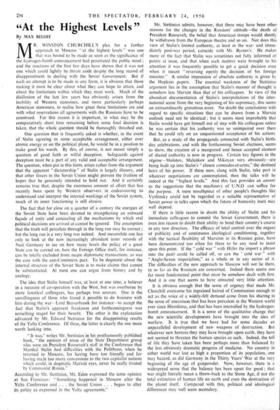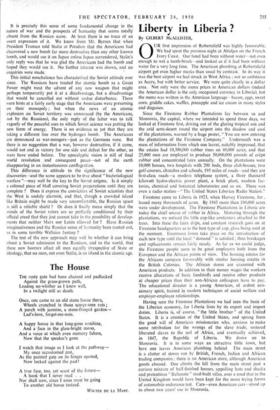“At the Highest Levels "
By MAX BELOFF
MR. WINSTON CHURCHILL'S plea for a further approach to Moscow "at the highest levels" was one that was bound to be made as soon as the significance of the hydrogen-bomb announcement had penetrated the public mind ; and the reactions of the first few days have shown that it was not one which could lightly be thrust aside despite the long record of disappointment in dealing with the Soviet Government. But if such an attempt is to be made in any form, it is obvious that those making it must be clear about what they can hope to attain, and about the limitations within which they must work. Much of the disillusion of the last few years has obviously arisen from the inability of Western statesmen, and more particularly perhaps American statesmen, to realise how great these limitations are and with what reservations all agreements with the Russians have to be construed. For this reason it is important, in what may be the comparatively short time remaining before some final decision is taken, that the whole question should be thoroughly thrashed out.
One question that is frequently asked is whether, in the event of Stalin agreeing to some acceptable arrangement, either over atomic energy or on the political plane, he would be in a position to make good his words. By this, of course, is not meant simply a question of good faith or wilful deception. Safeguards against deception must be a part of any valid and acceptable arrangement. The question, when put in this form, arises rather from the argument that the apparent " dictatorship " of Stalin is largely illusory, and that other forces in the Soviet Union might prevent the fruition of hopes that he genuinely intended to hold out. And it certainly remains true that, despite the enormous amount of effort that has recently been spent by Western observers in endeavouring to understand and interpret the internal workings of the Soviet system, much of its inner functioning is still elusive.
The fact that for close on a quarter of a century the energies of the Soviet State have been devoted to strengthening an outward facade of unity and concealing all the mechanisms by which real political decisions are arrived at cannot be ignored. The assumption that the truth will percolate through in the long run may be correct ; but the long run is a very long run indeed. And meanwhile one has only to look at the now increasingly abundant inner records of Nazi Germany to see on how many levels the policy of a great State can be carried on, how the Foreign Office itself, for instance, can be totally excluded from major diplomatic transactions. as was the case with the anti-Comintern pact. To be dogmatic about the internal structure of the Soviet State is to make claims that cannot be substantiated. At most one can argue from history and by analogy.
The idea that Stalin himself was, at least at one time, a believer in a measure of co-operation with the West, but was overborne by more fanatical colleagues, has perhaps two .sources. One is the unwillingness of those who found it possible to do business with him during the war—Lord Beaverbrook for instance—to accept the fact that Stalin's apparent frankness and forthcomingness was something staged for their benefit. The other is the explanation advanced by Mr. Edward Stettinius for the disappointing results of the Yalta Conference. Of these, the latter is clearly the one more worth looking into.
"It was," writes Mr. Stettinius in his posthumously published book, "the opinion of some of the State Department group who were on President Roosevelt's staff at the Conference that Marshal Stalin had difficulties with the Politburo, when he returned to Moscow, for having been too friendly and for having made too many concessions to the two capitalist nations which could, in dogmatic Marxist eyes, never be really trusted by Communist Russia."
According to Mr. Stettinius, Mr. Eden expressed the same opinion at San Francisco: "Something happened in Moscow after the Yalta Conference and . . . the Soviet Union . . . began to alter Its policy as expressed in the Yalta agreements." Mr. Stettinius admits, however, that there may have been other reasons for the changes in the Russians' attitude—the death of President Roosevelt, the belief that American troops would shortly be withdrawn from the European theatre and so on. Nor does this view of Stalin's limited authority, at least in the war- and imme- diately post-war period, coincide with Mr. Byrnes's. He makes more of the fact that Stalin was sometimes not fully informed of points at issue, and that when such matters were brought to his attention it was frequently possible to get a quick decision even when it meant "reversing openly the decision of his foreign minister." A similar impression of absolute authority is given by the Hopkins papers. The essential weakness of the Stettinius argument lies in the assumption that Stalin's manner of thought is somehow less Marxist than that of his colleagues. In view cf the abundant documentation of Stalin's interpretations of the inter- national scene from the very beginning of his supremacy, this seems an extraordinarily gratuitous error. No doubt the conclusions with regard to specific situations that can be drawn from a Marxist outlook need not be identical ; but it seems most improbable that Stalin would have got himself out of step with his colleagues unless he was certain that his authority was so unimpaired over them that he could rely on an unquestioned acceptance of his actions But, as a study of the propaganda connected with Stalin's birth- day celebrations, and with the forthcoming Soviet elections, seems to show, the creation of a recognised and hence accepted element of shared authority is now in progress. Certain key figures in the regime—Molotov, Malenkov and Mikoyan very obviously—are being built up into Stalin's "closest comrades-at-arms," the destined heirs of his power. If these men, along with Stalin, take part in whatever negotiations are contemplated, then the talks will be indeed at the "highest levels." And this fact provides an answer to the suggestions that the machinery of U.N.0 can suffice for the purpose. A mere mouthpiece of other people's thoughts like Vyshinsky could not be regarded as a suitable representative of Soviet power in talks upon which the future of humanity itself may well depend.
If there is little reason to doubt the ability of Stalin and his immediate colleagues to commit the Soviet Government, there is even less reason to doubt their ability to bend their country's course in any new direction. The efficacy of total control over the organs of publicity and of continuous ideological conditioning, together with the tactical flexibility of Marxism in its Russian guise, have been demonstrated too often for there to be any need to insist upon this point. If the "cold war" with Hitler (to import a phrase into the past) could be called off, so can the cold war" with "Anglo-Saxon imperialism," as a whole or in any sector of it. The difficulties of the new approach to Moscow will not lie there, in so far as the Russians are concerned. Indeed there seems one far more fundamental point that must be somehow dealt with first. And it is one that seems to have attracted very little attention. It is obvious enough that the sense of urgency that made Mr. Churchill overcome his ingrained hatred of Communism enough to act as the voice of a widely-felt demand arose from his sharing in the sense of uneasiness that has been prevalent in the Western world ever since Hiroshima, and that has been intensified by the hydrogen- bomb announcement. It is a sense of the qualitative change that the new scientific developments have brought into the idea of warfare. It is true that we have had for some decades an unparalleled development of new weapons of destruction. But whatever new horrors they may have brought upon earth, they have not seemed to threaten the human species as such. Indeed, the toll of life they have taken has been perhaps more than balanced by the less obviously dramatic progress of medicine. No country in either world war lost as high a proportion of its population, one may hazard, as did Germany in the Thirty Years' War at the very beginning of the age of gunpowder. Now, however, there is a widespread sense that the balance has been upset for good ; that war might literally mean a throw-back to the Stone Age, if not the total extinction of human life on earth and even the destruction of the planet itself. Compared with this, political and ideological differences may well seem secondary. It is precisely this sense of some fundamental change in the nature of war and the prospect.s of humanity that seems totally absent from the Russian scene. At least there is no trace of an overt expression of it. We know from Mr. Byrnes that when President Truman told Stalin at Potsdam that the Americans had discovered a new bomb far more destructive than any other known bomb, and would use it on Japan unless Japan surrendered, Stalin's only reply was that he was glad the Americans had the bomb and hoped they would use it. No further interest was shown, and no enquiries were made.
This initial nonchalance has characterised the Soviet attitude ever since. The Russians have treated the atomic bomb as a Great Power might treat the advent of any new weapon that might perhaps temporarily put it at a disadvantage, but a disadvantage that would be cancelled out without undue disturbance. There were hints at a fairly early stage that the Americans were presuming on their monopoly ; but when the news of an atomic explosion on Soviet territory was announced (by the Americans, not by the Russians), the only reply of the latter was to talk vaguely of the peaceful uses to which Soviet science was putting the new form of energy. There is no evidence as yet that they are taking a different line over the hydrogen bomb. The Americans are denounced as war-mongers—just as the Germans were. But there is no suggestion that a war, however destructive, if it came, would not end in victory for one side and defeat for the other, as wars have ended before. The apocalyptic vision is still of final world revolution and consequent peace—not of the earth disappearing in an instantaneous conflagration.
This difference in attitude to the significance of the new discoveries—and the same appears to be true about "bacteriological warfare "—may well be the key to the Soviet enigma. Is it simply a colossal piece of bluff covering Soviet preparations until they are complete ? Does it express the conviction of Soviet scientists that the West is unduly alarmist, and that, though a crowded island like Britain might be made very uncomfortable, the Russian space is still a reliable shield ? Or does it finally mean simply that the minds of the Soviet rulers are so perfectly conditioned by their official creed that they just cannot take in the possibility of develop- ments that neither Marx nor Lenin allowed for ? Have Russian imaginativeness and the Russian sense of humanity been rooted out, as in some terrible Wellsian fantasy ?
The test of the new approach may well be whether it can bring about a Soviet admission to the Russians, and to the world, that these new horrors affect all men equally irrespective of State or ideology, that no man, not even Stalin, is an island in the atomic age.



































 Previous page
Previous page